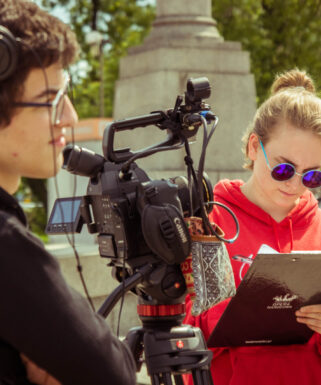
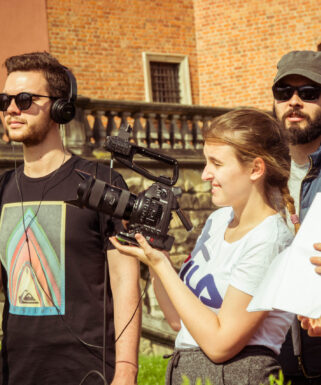
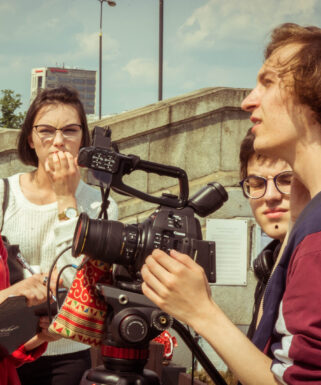
MASTERCLASS FILMMAKING
Filmforum Poland
Description
„MASTERCLASS – School of Filmmaking“ is a series of free workshops, where young people have a chance to work with the best specialists in the industry and create their very first short film.
During the workshops, participants are able not only to meet their peers who are also thinking about starting a career in the film industry, but most of all they will gain competences necessary in the process of creating a film. The „MASTERCLASS – School of Filmmaking“ is a creative work in task groups, numerous practical exercises and classes with professionals from particular fields of film. Classes are carried out with the use of modern film equipment provided by the organizers.
Workshops are based on promoted by EU peer education methods, in which participants of numerous programs educate and develop the talents of their less experienced colleagues.
Target Groups
The activities are directed at young people age 15-21 from small towns and with limited financial resources. Most of them had no previous experience with film industry.
Goals
The workshops mission is to enable young to start operating in the film industry, for whom it would otherwise be much more difficult and very expensive. MASTERCLASS – School of Filmamking is also a great test and for many of participants first situation when they work on a big and complicated project with many different people. They have to learn to cooperate to achieve goals. Sometimes it is very difficult as they have to work on a creative conception, let go of their own ambitions and ego. Many of them are able to find out if they feel better as leaders or part oft he group.
Response & Results
During 7 editions of the workshops almost 150 young people were able to take the first step into the film industry. Many oft hem are now working on their own film projects, some already have a succesful career.. Workshops are not only a way of starting a career but also enables young people to find their own creative life path, discover their talents and learn how to work in a dynamic group with lots of different personalities.
Methods
The workshops consist of integration meetings, lectures conducted by specialists from the film industry who present the specifics of individual fields like screenwriting, film development, directing, editing, picture production, acting and film production. Group classes teach participants how to work in a film crew at various stages of film making and on a film set. Participants are able to consult their film projects with mentors at every stage. Young filmmakers are also working on post-production, where, with the support of professionals, they edit their own short films. An important part oft he project is also the promotion and dissemination of completed films.
Links
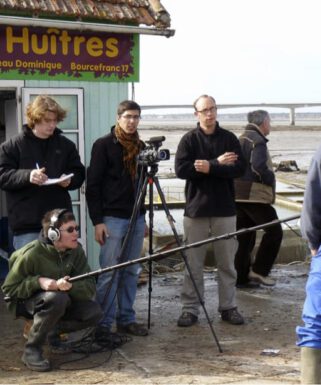
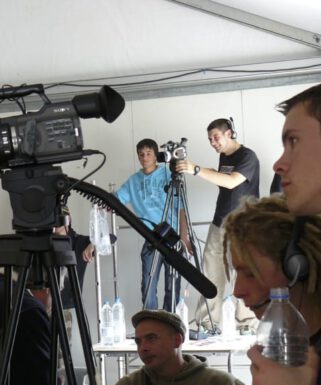
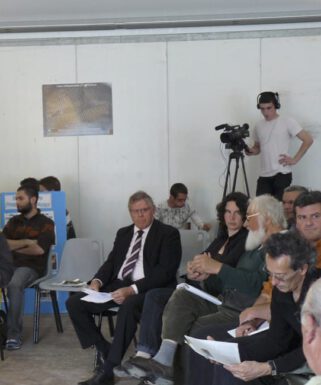
Innovative Educational Action: Video-Reporters for a sustainable aquaculture in the Marennes-Oleron basin
Mo-TV France
Description
The 3 videos, among which „H2O mon amour, mais soyons SAGE” is the first and main one, are
the achievement of a video-project made by young vocational high school students, studying in the field of “aquaculture”, i.e. fish and shellfish farming, of a french vocational high school relevant to Ministry of Agriculture, located in the Marennes-Oléron coastal area, the main oyster producing area in the French Atlantic coast.
The project was a cooperation between the vocational high-school and the “particpatory video” structure, “Mo-Tv”.
Target Groups
The activities are directed towards young vocational high school students, -studying in the field of fish and shellfish farming-, aged from 16 to 20 years, mainly coming from countryside areas with poor cultural facilities.
As vocational high school students, these students feel less self-confident comparing to the
normal cursus high school students of the same school.
Goals
The video workshop is aimed at helping these students to think about their future professional
activity and to participate in the debates on its economic and environmental future.
More broadly, to give them not only “practical” teaching but also to develop their “intellectual”
skills to be fully future “stakeholders” of their professional sector and their local territory, through the mean of “video-report”.
Response & Results
During 7 editions of the workshops almost 150 young people were able to take the first step into the film industry. Many of them are now working on their own film projects, some already have a succesful career. Workshops are not only a way of starting a career but also enables young people to find their own creative life path, discover their talents and learn how to work in a dynamic group with lots of different personalities.
Methods
A video workshop starts with collecting of student “representations” about their vocational field and media, then have 3 preparatory parts:
- A brief training in “journalist investigation” (preparing topics, questions), led by a former
journalist of “Mo-Tv”
- A training to “problematize”, to identify the elements of he vocational courses to invest in the reports, and to find and choose right interlocutors, led by their vocational professor of the high school.
- A training in video shooting and sound recording techniques, led by video technician of “Mo-Tv”.
- The base of communication in student groups are respect for the opinion of others and the active participation of everyone in all tasks.
Then the key concept comes out as a common thread, scenario of the film, and interviews can be prepared.
Students learned the main roles in movie making by rotating the role they have: Cameraman,
Sound engineer, Script, Journalist-Interviewer.
Links
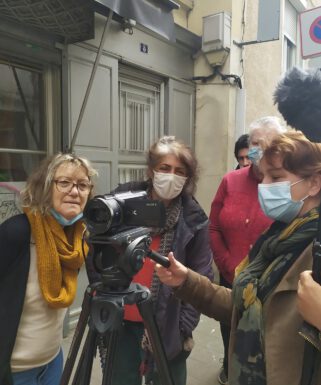
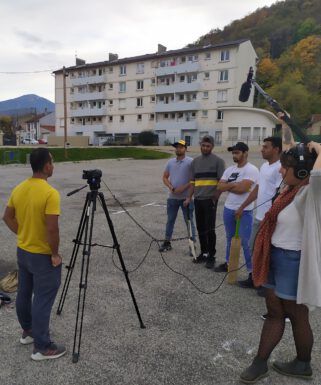
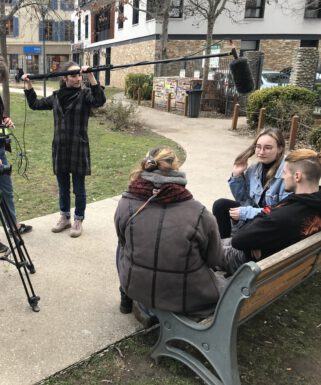
Radioscopy of neighborhood by its inhabitants
La Télé-Buissonnière
Description
A team of the media invests amicro-territory for 3 months by making a systematic door to door action, to meet the inhabitants and directly collect their speech. So takes shape a
collective overview upon the neighborhood that we then picture listening to the
propositions of the people we meet. All kinds of productions are then possible: portraits of a inhabitant, debate on a current issue, documentary giving value to some dynamics, direct witness on the neighborhood’s life
Target Groups
The “detained”, those whom the speech is not often heard of : people in poverty, unschooled youngs, isolated women.
Goals
Our goal is to witness the reality lived by the inhabitants not by accentuating the ambient
discomfort. The collection-report has to lead to some creations-perspectives. The idea is to create and think collectively about the movies we can make with the people and their neighborhood, so that it can be an instrument of social communication and expression. In this way the movies also become a means of mediation between the inhabitants and the public institutions.
Response & Results
Since 2016, we have made 19 radioscopies, and met a lot of people around our region. This was,
several times, the way to create dialogue around the final screening of our projects.
Methods
In a micro-territory, we take three months to survey the buildings around. Without
cameras, we go to knock on each door to collect the speech and the wills of the inhabitants. We ask them the question : what should we show from the neighborhood ? Then comes the moment to enter in creation.
At this point, some become craftsman-inhabitant when others prefer being author-inhabitant or just idea launcher. By experience, there’s those who want to value their space of
living, by making a portrait of a local figure or a documentary about local
initiative. For some others, this is important to point out the problems. Our work then consists of setting up some device to approach the question in its complexity and by bringing some
solution track. For example, we can film a meeting between a group of
inhabitants and a professional or an elected person who’s in charge of the
case. After 3 months collecting speech, shooting, editing, the broadcast Radioscopy from the
neighborhood is composed of the subjects created with the inhabitants. They accept to broadcast it in the local cinema, on our web-tv or only on the evening of a screening-event in a room of the neighborhood.
Links
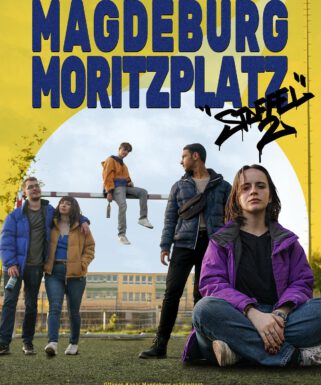
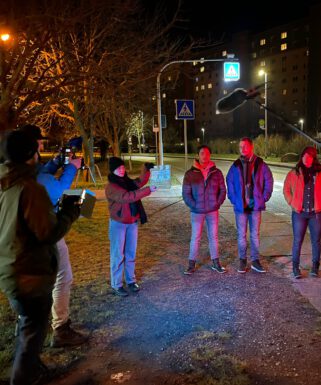
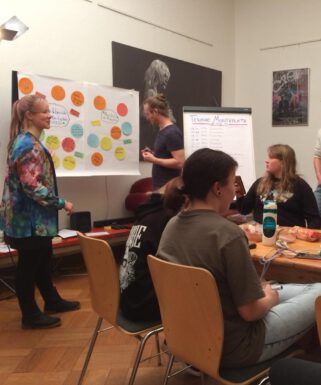
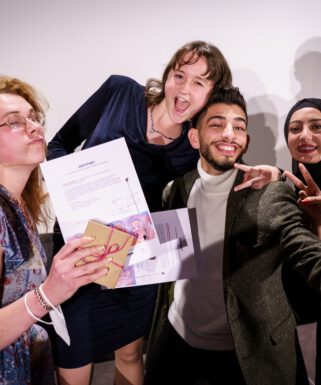
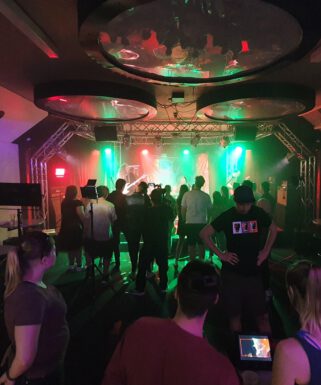
Magdeburg Moritzplatz
– Participatory Coming-of-Age-Show
Offener Kanal Magdeburg
Description
Many different cultures, conflicts, poverty, violence, noise, life, change – the „Moritzplatz“
in Magdeburg exists all over the world. It is a cipher for a place full of contradictions, where people from many nations meet „natives“, who often react hostile and no longer understand the world.
But for our project, it is above all one thing: material for a series with a total
of 10 episodes, filmed between 2019 and 2022 with young amateur actors at
original locations.
Under the guidance of media educators and together with professional
filmmakers, young people produced two
seasons of the series „Magdeburg Moritzplatz“. The stories are based
on their experiences, their biographies and their lives in this very special
part of town: it is about refugee experiences, friendship, family, religion,
identity.
The participants took part in numerous workshops on film production: script
workshops, acting training, lighting, camera and sound workshops. The music for
the series was also composed together with film musicians. In short: the young
people were involved in all stages of the production.
Target Groups
A total of about 80 young people between the ages of 15 and 25 from the district in which the series is set were involved. About half were young people with a migration background,
including many refugees who had been driven to Germany by the war in Syria in
2015. The other half were „natives“, young people who had lived in Magdeburg since birth.
Goals
The goals of the project were manifold: in addition to empowering the participants and teaching them a wide range of skills in the media and social areas, the main aim was to create
acceptance for other cultures and ways of life. The project wanted – learning by doing – to fill the word integration with life: a learning process for all participants, in which conflicts are normal and in which the cohesion of all participants is strengthened.
Response & Results
The immediate results of the project are two seasons of a series as well as two making-ofs, which has found and continues to find thousands of viewers in Germany and other
countries. The series with English and Arabic subtitles is available on demand in the media library of the Offener Kanal Magdeburg.
It won the 50,000 euro „Power of the Art Award“, which is given for outstanding artistic
projects that promote an open society.
In addition, „Magdeburg Moritzplatz“ was selected in June 2023 for the Digital Series Festival, dedicated to present and celebrate short form digital series. „The aim is to connect, support and pay tribute to all talented creators from around the world and to advertise their wonderful work.“
But much more important is what „Mageburg Moritzplatz“ means to everyone involved in the project: an intensive and comprehensive development and educational process that has had a lasting impact and changed everyone. With the skills they acquired, many participants are now in other creative projects in the field of film and acting; others have discovered and developed
interests and talents that are decisive in a different way for their career choice. All of them have made acquaintance with cultures that were foreign to them and before which they have now lost all shyness. „Magdeburg Moritzplatz“ was itself a model place where all who were there experienced that a multicultural utopia is possible.
Methods
The project was led by Susann Frömmer and Christoph Paul Börner, two educators and filmmakers who studied „Media Education“ at the University of Magdeburg. The key approach and method of their work is „active media work“ and the Theory behind it is „Medienbildung„. Active media work aims to transform media users into media producers by creating their own media products. Active media work is the fundamental method of what is known as action-oriented media pedagogy. This, in turn, is a widely adopted concept that emphasizes self-determined and critically reflective media use. At the core of this concept is the belief that individuals are seen as self-determined beings who possess agency and creative freedom.
